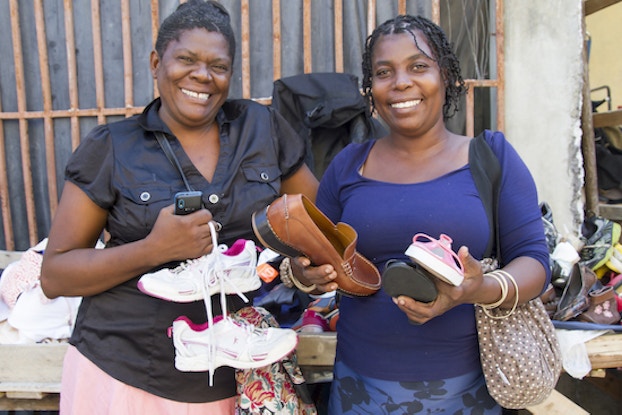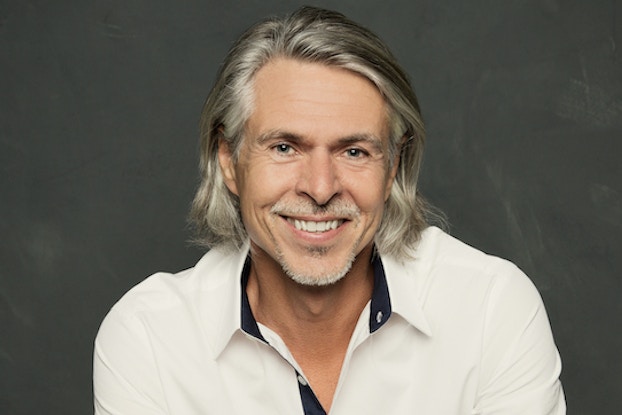
Soles4Souls, a company that provides footwear and clothing to people in need, decided it was time for a supply chain shakeup.
Rather than depend too much on middlemen to move goods to poverty- and disaster-stricken areas of the globe, the nonprofit decided to increase reliance on in-country nonprofits, business partners working directly with people living on the margins: the microentrepreneurs who resell the merchandise at a profit.
Though the middlemen – wholesale outfits, mostly – are good business partners, the value of goods moving through their channels erodes once it reaches those in need, Buddy Teaster, CEO of Soles4Souls, told CO—.
By contrast, footwear and apparel funneling through these more direct supply chain partners — those in-country nonprofits working directly with people in need — ensure higher quality at a better price. Goods arrive in better condition for the local micro-entrepreneurs in impoverished countries, yielding them a higher profit margin, Teaster said.
“We needed to cut out the middlemen,” Teaster said.
Soles4Souls’ model also has it partnering with big retail to accomplish its mission.
DSW, the $2.8 billion footwear chain, offers its 26 million loyalty members perks such as early access to exclusive product offers and events and faster accruing rewards for donating mostly used shoes to Soles4Souls— a reflection of the growing importance of conscious consumption to shoppers, the retailer’s CEO Roger Rawlins has said.
Soles4Souls creates sustainable jobs in places like Haiti and Honduras by supplying donated shoes and clothing to micro-entrepreneurs, mostly women, who resell at a profit to support their families. The new and gently used merchandise flows through wholesalers that take a cut of profits for themselves, and also increasinglythrough “boots on the ground” in-country nonprofits that deliver direct, far greater value to the small business owners, Teaster said.
If we have the ability to improve the supply chain so it benefits her, the micro-entrepreneur, and not these guys in the middle, we should do that.Buddy Teaster, CEO, Soles4Souls
Teaster wanted more nonprofits in the mix because their impact outshines everyone else, he said. For example, the old supply chain model enabled a Haitian woman to buy a pair of shoes for $8 and resell it for $12, earning a $4 profit. Under the new model, the Haitian woman pays a nonprofit Soles4Souls partner just $3 for a pair of shoes, yielding $9 profit on each sale – more than double the margin had she purchased goods from a wholesaler. Goods moving through nonprofits maintain higher quality because fewer touches in direct channels reduce risk of damage. Higher quality goods turn faster and generate profits, enabling microbusinesses to purchase more inventory to sell, and thrive, Teaster said.
“If we have the ability to improve the supply chain so it benefits her, the micro-entrepreneur, and not these guys in the middle, we should do that,” Teaster said. “It turned out to be harder than we thought.”
The shift was harder because nonprofits have limited resources. “They are working hard to keep the lights on every day,” Teaster said. To give nonprofits more time to pay, Soles4Souls stretched its own line of credit.
Another challenge was finding trustworthy partners as the program expanded to Malawi, Uganda and Zambia in 2018. Efforts to bring the micro-enterprise program to Nicaragua were halted by violence there.
“Identifying partners was harder and took more time than we thought,” Teaster said. In the countries where Soles4Souls works, political instability and a less-than-user-friendly banking system make life hard every day for the people who live there, he said. “So, to come in and say, ‘We want to get into the shoe business with you and here is what we need from you’ – it’s a big ask.”
In 2018, Soles4Souls supplied 2.8 million pairs of shoes and 3.1 million items of clothing to the micro-enterprise program. In addition, it distributed 152,000 pairs of brand new shoes and 515,000 items of new apparel – donated by retailers, manufacturers and consumers – to people in need and those affected by natural disasters in the United States and beyond.
Corporate partnerships like one with Macy’s, which donated 200,000 new coats over five years, and with DSW, whose customers donated nearly 1 million pairs of new and gently used shoes in 2018, are integral to Soles4Souls’ success.

Teaster is jazzed about another metric: “Our goal is to have $1 billion in economic impact by 2030,” he told CO–. This metric is unique to Soles4Souls, which assigns a dollar value to every item – shoes and apparel, new or used – and calculates its value according to the channel of distribution: disaster response, free goods to people in need and the direct micro-enterprise channel fueling small business in developing countries.
“We know how we will get to $800 million but we have to get smarter and work harder to figure out that last chunk” to reach the $1 billion economic impact goal, he said. Soles4Souls’ “no margin, no mission” mantra reinforces the importance of sound business decisions and the need for creative problem solving.
Case in point: When Toys “R” Us went belly up in 2018, 144,000 pairs of shoes destined for stores had nowhere to go. The owner hoped to unload inventory to Soles4Souls but shipping to its partner in Moldova did not make good business sense. The math didn’t work; it would take eight shipping containers to transport each pair of shoes in its own box. “So we said, ‘Well, wait a minute. What if we paid the labor to take all the shoes out of the boxes?’” Teaster said. The unboxed shoes fit inside two shipping containers, far less expensive than eight containers, and Soles4Souls broke even on the deal, not losing nor generating revenue on the deal.
“We now have this more comprehensive way of thinking that is not just profit and loss, but impact. We sent 144,000 shoes to Moldova and the reason we were able to do that is we had a way to think about it that was more than one dimension,” Teaster said. “We have our mission, vision, values but we didn’t really have a metric to test those against.”
Now they do. “Doing the right thing has had consequences,” Teaster said, noting that other Soles4Souls programs have been deferred as a result. “The thing I love is that we are doing it cautiously and for the right reasons. To me, that is a great example of how our board does its job to help us.”
Barbara Thau contributed to this story.
CO— aims to bring you inspiration from leading respected experts. However, before making any business decision, you should consult a professional who can advise you based on your individual situation.
CO—is committed to helping you start, run and grow your small business. Learn more about the benefits of small business membership in the U.S. Chamber of Commerce, here.

What can membership do for your business?
Gain tools to stay informed, competitive, and connected by becoming a U.S. Chamber of Commerce member. Membership gives you direct access to expert policy insights, economic updates, and exclusive resources designed to help your business thrive. From behind-the-scenes analysis from D.C. to exclusive discounts and expert support, U.S. Chamber membership helps you navigate change and seize new opportunities.




